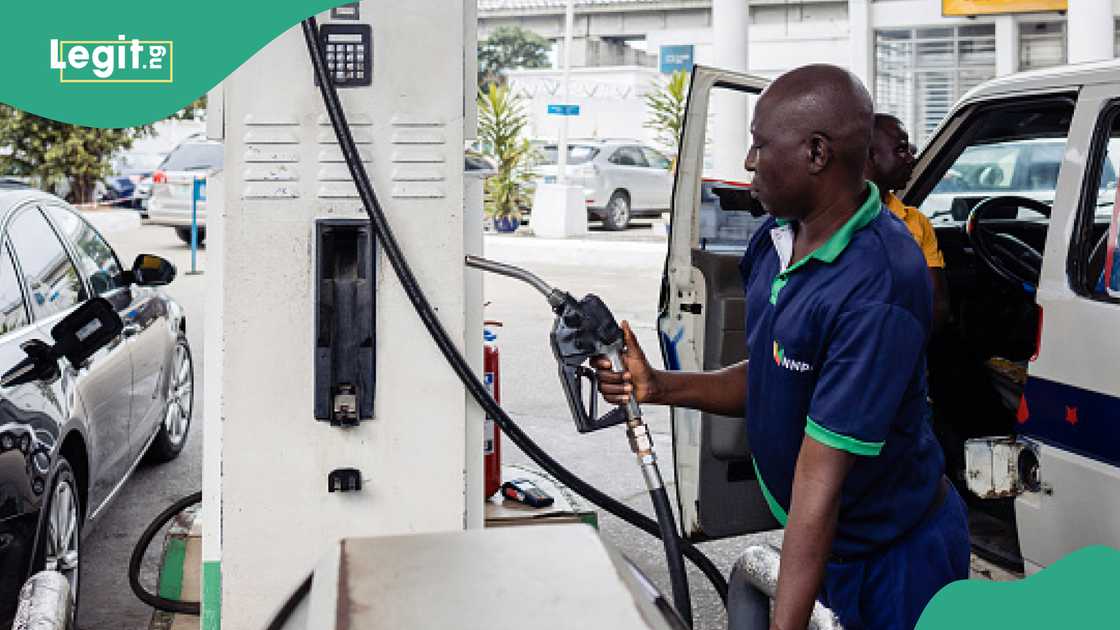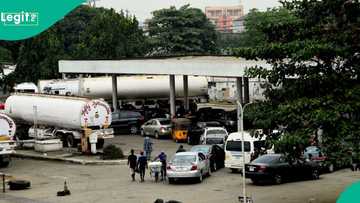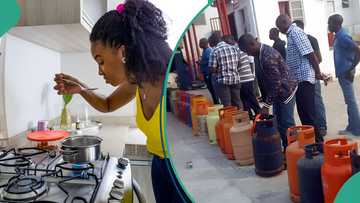Fuel Prices Climb as Crude Oil Surges, 7 Depot Owners Raise Rates Nationwide
- Fuel depot prices across Nigeria were on the rise again, and the reason was clear, crude oil benchmarks had climbed fast
- Legit.ng findings showed widespread increases across Lagos, Port Harcourt, and Warri depots as marketers struggled to keep up with global cost shifts
- The development came as crude oil prices surged, with Brent Crude selling near $73 per barrel as of Wednesday, July 30, 2025
Legit.ng’s Pascal Oparada has reported on tech, energy, stocks, investment and the economy for over a decade.
The impact of rising oil prices is evident at Nigerian depots.
According to data, several depots increased Premium Motor Spirit (PMS) prices by modest margins.

Source: UGC
Lagos sees gradual uptick in petrol prices
For example, Matrix in Port Harcourt moved from ₦840 to ₦845 per litre.
Warri’s Rainoil depot posted a notable ₦25/litre jump, from ₦830 to ₦855, suggesting localised supply strain.

Read also
Wema Bank joins Zenith, Access in CBN recapitalisation race, meets target ahead of deadline
Meanwhile, A&E and Parker depots in the same city recorded no change or slight decreases, reflecting uneven cost absorption.
Lagos-based depots also mirrored national shifts, though increases were modest.
Nipco adjusted from ₦818 to ₦825 (+0.86%), and Aiteo followed suit, rising from ₦815 to ₦822.
These upward adjustments highlight how depot operators are gradually factoring in higher input costs.
According to Petroleumprice.ng, while the changes may not yet fully reflect at the pump, retailers are likely recalculating their margins in anticipation of sustained supply cost hikes.
Diesel prices record steepest spike nationwide
Diesel (Automotive Gas Oil, AGO) saw the most dramatic rise, with some depots recording double-digit jumps.
In Lagos, Obat's price surged from ₦1005 to ₦1130—up 12.44%. Matrix in Warri jumped by nearly ₦140, from ₦1010 to ₦1150 (+13.86%).
These spikes suggest diesel is more acutely sensitive to global crude fluctuations, possibly due to refined product dependency and demand from haulage, industrial, and power sectors.
Dangote’s sourcing strategy adds market sensitivity
Industry analysts point out that Dangote Refinery’s international sourcing for nearly half its feedstock increases price exposure.
This model, while cost-effective in theory, links local product prices to global oil volatility.
Any uptick in Brent or WTI is likely to echo across Nigerian depot rates unless mitigated by stable forex access or government intervention.
Forex market also plays a vital role
Marketers warn that the naira’s value will be crucial in determining whether depot prices stabilise or rise further. Most operators purchase foreign exchange from the parallel market, where rates remain volatile.
Any widening gap between official and black-market forex rates could intensify price fluctuations, especially if crude prices remain high.
A prior report by Legit.ng disclosed that independent marketers slashed their prices below Dangote Refinery’s rate.
Petrol marketers have fired a major shot in Nigeria’s downstream oil war, slashing prices below the Dangote Petroleum Refinery’s rate.
Findings show that some depots and retail stations now offer petrol at N815 to N847 per litre, cheaper than the N820 per litre from Dangote and N825 from the Nigerian National Petroleum Company (NNPC).
Consumers should expect gradual retail adjustments
Although pump prices have yet to fully reflect this week’s depot hikes, retail increases may soon follow.
Many fuel stations wait for cumulative hikes before adjusting prices to avoid daily disruptions.

Source: Getty Images
For now, stakeholders are closely watching global oil movements, FX dynamics, and regulatory cues to assess the next market direction.
Dangote battles marketers over fuel imports
Legit.ng earlier reported that Aliko Dangote, President of Dangote Group, called on President Bola Tinubu to expand the 'Nigeria First' policy by banning the importation of refined petroleum products.
His request, made at a major industry conference, sparked intense backlash from independent oil marketers and sector analysts who say such a move could cripple competition and empower a monopoly.
The ‘Nigeria First’ directive, announced in May 2025, restricts government agencies from importing goods and services that are already available locally, unless granted a special waiver.
Proofreading by Funmilayo Aremu, copy editor at Legit.ng.
Source: Legit.ng





